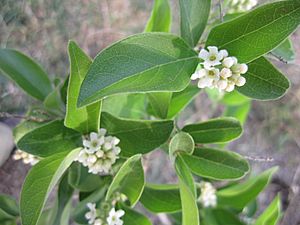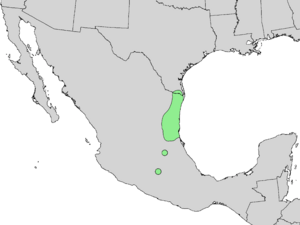Tamaulipan fiddlewood facts for kids
Quick facts for kids Tamaulipan fiddlewood |
|
|---|---|
 |
|
| Conservation status | |
| Scientific classification |
|
| Kingdom: | Plantae |
| Clade: | Tracheophytes |
| Clade: | Angiosperms |
| Clade: | Eudicots |
| Clade: | Asterids |
| Order: | Lamiales |
| Family: | Verbenaceae |
| Genus: | Citharexylum |
| Species: |
C. berlandieri
|
| Binomial name | |
| Citharexylum berlandieri B.L.Rob.
|
|
 |
|
| Natural range of Citharexylum berlandieri | |
| Script error: The function "autoWithCaption" does not exist. | |
Script error: No such module "Check for conflicting parameters".
Citharexylum berlandieri is a type of flowering plant. It belongs to the verbena family, called Verbenaceae. This plant is found naturally in the Lower Rio Grande Valley of Texas in the United States. It also grows in Mexico, reaching as far south as Oaxaca.
People know this plant by several common names. These include Tamaulipan fiddlewood, Berlandier fiddlewood, negrito fiddlewood, negrito, and orcajuela. It can grow as a shrub or a small tree. It can reach a height of about 6 m (20 ft), which is like a two-story building.
About This Plant
The first official sample of Citharexylum berlandieri was collected in 1890. This happened in the hills near Las Canoas, San Luis Potosí, by a person named Cyrus Pringle. The next year, in 1891, Benjamin Lincoln Robinson described it as a new species. He named it berlandieri to honor Jean-Louis Berlandier, a French naturalist.
Where It Grows
This plant loves warm places. Its natural home stretches from the Lower Rio Grande Valley in Texas down into Mexico. You can find it in many Mexican states, including Oaxaca. It thrives in these areas, which have a warm climate.
What It Looks Like
Citharexylum berlandieri can be either a bushy shrub or a slender tree. It grows up to 6 meters (about 20 feet) tall. This makes it a medium-sized plant in its habitat. Its flowers are part of what makes it a "flowering plant."
How People Use It
In Mexico, the bark of the Citharexylum berlandieri plant has a special use. People collect its bark to use as firewood. This helps them cook food and stay warm.
See also
 In Spanish: Citharexylum berlandieri para niños
In Spanish: Citharexylum berlandieri para niños
 | Janet Taylor Pickett |
 | Synthia Saint James |
 | Howardena Pindell |
 | Faith Ringgold |


